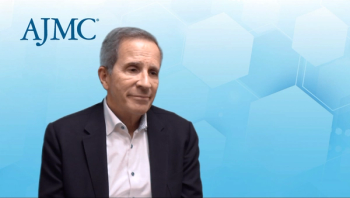
There are many options to try for patients if one therapy doesn’t work, but there are challenges around getting new treatments into the clinic, said Joshua Meeks, MD, PhD, of Northwestern University Feinberg School of Medicine.

There are many options to try for patients if one therapy doesn’t work, but there are challenges around getting new treatments into the clinic, said Joshua Meeks, MD, PhD, of Northwestern University Feinberg School of Medicine.

The novel intravesical drug delivery system releases erdafitinib locally within the bladder while limiting systemic toxicities.

Quoc-Dien Trinh, MD, MBA, chief of urology at Brigham & Women's Faulkner Hospital, highlighted successful efforts to improve prostate cancer care access for underserved communities in Massachusetts.

Evolving treatment for bladder cancer is going to require a multidisciplinary team to ensure patients are receiving optimal care, said Neal D. Shore, MD, FACS, medical director of the Carolina Urologic Research Center.

Updated findings from SunRISe-1 also showed that all but 1 responder achieved complete response within 12 weeks of treatment with the targeted gemcitabine delivery system.

Speakers discussed the disparities in prostate-specific antigen (PSA) screening rates among different racial groups and explored the potential of free PSA percentage as a predictive marker for future prostate cancer risk.

About 5000 leaders in health economics and outcomes research will gather for the 2024 meeting, which has the theme, "HEOR: A Transformative Force for Whole Health.”

Darius Lakdawalla, PhD, director of research, Schaeffer Center for Health Policy & Economics at the University of Southern California, discusses the growing importance of value assessment in the US market, highlighting research gaps and the need for equitable access to prescription drugs, as a presenter at the ISPOR 2024 conference.

In a session during the final full day of conference activity at AXS24, experts from CVS Health and Surescripts emphasized the need to simplify the prescribing workflow for specialty medication through proactive messaging, automation, and interoperability.

While the novel payment models for expensive cell and gene therapies have been effective, they need to continue evolving, said Joe DePinto, MBA, of McKesson.

Representatives from ICON plc and Symphony Health joined forces at AXS24 to discuss the challenges of managing high-cost specialty drugs and how they influence self-funded employer benefit plan design and employee access to specialty medications.

In the US, a disease is considered rare when it affects fewer than 200,000 persons, or 1 in every 1500 individuals, with an estimated total of 25 to 30 million Americans overall living with a rare disease at any given time.

The health-system specialty pharmacy has the unique ability to coordinate better with the provider and take a team approach that reduces the chances of dropping the ball on the patient’s care.

The annual meeting of the American Urological Association (AUA) not only presents the newest therapies coming out but showcases the latest in how treatments are being used in the real world, said Stephen Freedland, MD, of Cedars Sinai.

There are multiple levers that need to be pulled to allow biosimilars to come to market more broadly in the US, explained Fran Gregory, PharmD, MBA, vice president of emerging therapies, Cardinal Health.

Doug Long, MBA, vice president of industry relations at IQVIA, covered a bevy of stakeholder investment–related topics in his presentation at AXS24 on trends in specialty pharmacy, chief among them challenges facing the industry, obesity medications, generics and biosimilars, new product launches, and the outlook for the US market.

Martin Dahl, PhD, of AnaptysBio discusses the findings and limitations of a study analyzing use of ANB032 in patients with atopic dermatitis (AD).

The American Urological Association (AUA) 2024 Annual Meeting will highlight the latest innovations and future trends in urology, featuring dynamic plenary sessions, educational opportunities for providers, and discussions on cutting-edge treatments and global health initiatives.

When the same product comes to market with additional indications, irrational pricing decisions result in ever-increasing prices instead of volume translating to lower costs, said Jon Mahrt, MBA, of OptumRX.

Optum Life Sciences and Takeda Pharmaceuticals are partnering on an innovative virtual care pilot program for inflammatory bowel disease meant to both continue the mission of the current value-based health care landscape and raise the bar for personalized care delivery optimization.

The real-time monitoring of patients through medically integrated dispensing (MID) programs can reduce costs of care and remove barriers, said Christie Smith, PharmD, MBA, vice president, pharmacy and payer strategy, Cencora.

Just as it is important for retail analysts to understand the choices their customers make and why they may choose not to purchase a specific item, so is it important for the specialty pharmacy industry to understand the actions of prescribers and how the often inefficient prior authorization process affects patient outcomes.

Payer coverage of biosimilars is always shifting as new ones come to market, explained Tasmina Hydery, PharmD, MBA, BCGP, associate director in digital solutions, Cencora.

Kathy Zackowski, PhD, National MS Society, expresses the inherent value of quality rehabilitation trials for broadening clinical understandings of multiple sclerosis (MS) and bettering patient outcomes.

Asembia AXS24, which has record registration this year, will take place in Las Vegas, Nevada, April 28-May 2, at the Wynn & Encore Las Vegas.

During their session at Asembia’s AXS24, Sarah Butler and Lindsay Greenleaf of ADVI Health will examine the current status of the Inflation Reduction Act (IRA) and future considerations in health care in the context of the upcoming presidential election.

Coverage from the Community Oncology Alliance Community Oncology Conference, held April 4-5, 2024, in Orlando, Florida.

At the Academy of Managed Care Pharmacy (AMCP) 2024 annual meeting, multiple poster presentations concerned with health equity, data collection, glucagon-like peptide-1 agonists, and more were acknowledged for their originality, relevance, clarity, bias, and quality.

The FDA granted accelerated approval to talquetamab on August 9, 2023, as a treatment option for adult patients with relapsed/refractory multiple myeloma (RRMM) who have failed at least 4 prior lines of therapy.

Session speakers at the Academy of Managed Care Pharmacy (AMCP) 2024 annual conference share their favorite parts of the event and the key takeaways they will leave the conference with.

259 Prospect Plains Rd, Bldg H
Cranbury, NJ 08512
© 2025 MJH Life Sciences®
All rights reserved.
